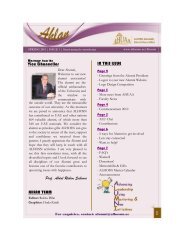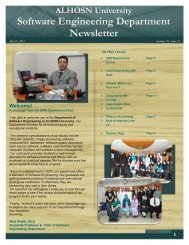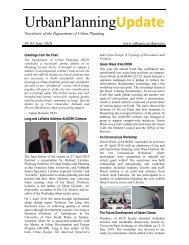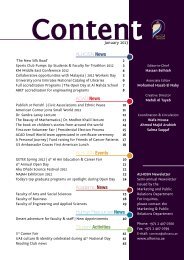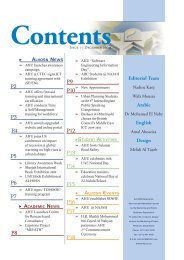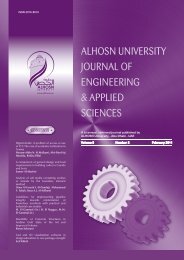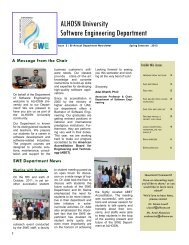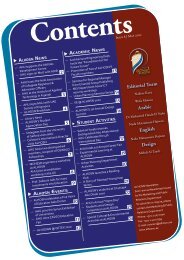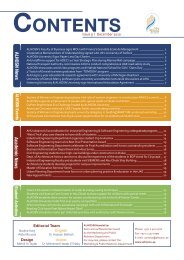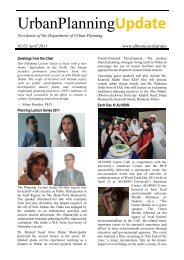ALHOSN University Catalogue Global Knowledge with Local Vision ...
ALHOSN University Catalogue Global Knowledge with Local Vision ...
ALHOSN University Catalogue Global Knowledge with Local Vision ...
You also want an ePaper? Increase the reach of your titles
YUMPU automatically turns print PDFs into web optimized ePapers that Google loves.
BSIE Elective Courses<br />
Selective Elective courses aim at providing students <strong>with</strong> a broad flexibility for their individual<br />
development in math and basic sciences. A total of 6 hours of selected electives is required<br />
<strong>University</strong> General Requirement Elective courses aim at enriching the student’s global perspective<br />
and intellectual level. A total of 6 hours of UGR is required<br />
Technical Elective courses aim at providing the student a method, technique and/or skill as a<br />
complement to Industrial Engineering. Special care must be taken for the course to be selected as<br />
“Complementary” so that its content does not coincide <strong>with</strong> an IE course. (New courses other than<br />
stated below are evaluated accordingly).<br />
A total of 9 hours of technical electives is required, of which 6 hours must be industrial engineering<br />
courses. The choice of courses to be taken must be made in consultation <strong>with</strong> the student’s advisor.<br />
Technical Electives (IE)<br />
Course Code Course Description Credits<br />
IND 452 Decision Systems 3<br />
IND 454 Risk Assessment 3<br />
IND 460 Product Design and Development 3<br />
IND 462 Statistical Models and Design of Experiments 3<br />
IND 471 E-Commerce 3<br />
IND 472 Logistics and Supply Chain Management 3<br />
IND 473 Financial Engineering 3<br />
IND 475 Safety Engineering 3<br />
Course Descriptions<br />
IND 212 Engineering Design and Drafting (2 = 1 + 1)<br />
Co-requisite: FAS 120<br />
Introduction to design: role of design in engineering, problem analysis, conceptual design and analysis, systems<br />
approach and detailed design including design for product life cycle. Technical drawing in compliance <strong>with</strong><br />
engineering standards: orthographic and auxiliary views, sections, dimensioning and tolerancing, assembly and<br />
working drawings. Sketching and CAD-based methods. A team-based design project will provide an overview of<br />
real design situations.<br />
IND 301 Engineering Economics (3 = 3 + 0)<br />
Prerequisite: FBA 100<br />
Engineering economic decision making based on comparisons of the worth of alternative courses of action <strong>with</strong><br />
respect to expected costs and benefits. Topics to be covered include comparison methods of present, annual worth<br />
of cash flow, and internal, external rates of return, depreciation, taxes, inflation and replacement analysis.<br />
IND 303 Work Analysis and Design (3 = 2 + 1)<br />
Prerequisite: IND 212<br />
General IE functions are introduced. Operation process chart, flow process chart, flow diagram, worker and<br />
machine process chart, and gang process chart are considered as recording and analysis tools. Principles of motion<br />
economy and motion study are discussed for manual work design. Work measurement tools covered include<br />
predetermined time systems: MTM-1, MTM-2, MTM-3, Maynard Operation Sequence Technique (MOST) and<br />
introduction to computer-based MOST; time-study systems: fundamentals of continuous and snap-back techniques<br />
for stop-watch, datamyte and palm- pilots; and analytical systems: work sampling and standard data development.<br />
A work-system design project is introduced requiring the integration and analysis of the topics covered.<br />
IND 305 Manufacturing Processes (3 = 2 + 1)<br />
Prerequisites: FES 240, FES 270<br />
An overview of manufacturing processes and methods <strong>with</strong> emphasis on understanding of the physical<br />
fundamentals of processes. The course will cover Material Removal Processes, Metal- Casting Processes and<br />
Equipment, Forming and Shaping processes and Shaping Processes for Plastics. Introduction to areas of<br />
108



